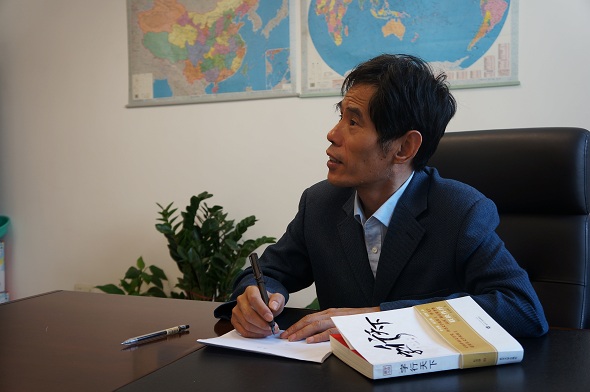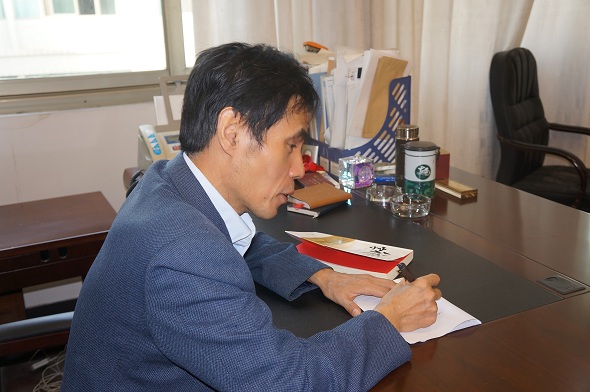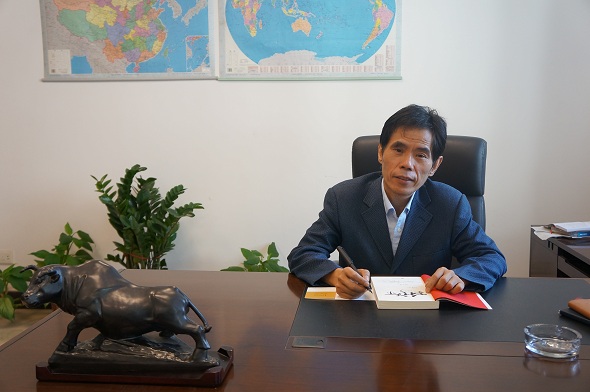--a dialogue with professor and writer Du Qinggang
For most people, when picturing a new book written by a college professor, a novel may not be the first idea that pops into their minds, let alone an intriguing and scintillating one. But Professor Du Qinggang wrote two. This October, as the Dean of School of Foreign Languages and Literature of Wuhan University, Professor Du brought us his latest work Zi Xing Tian Xia and shared with us his take on being a writer.

“Chinese characters are the backbones of our cultural identity”
One thing that makes the novel unique is the theme—glyphomancy, or fortune-telling by analyzing the strokes of Chinese characters. Such technique originated in early ancient China, culminated in Song Dynasty, and died down quickly after the founding of the People’s Republic of China, possibly as a result of handwriting Chinese characters being increasingly sidelined by typing. “Unlike reading palms or using tarot cards, telling fortunes with Chinese characters would require a person to be well-read,” Professor Du grinned as he commented on the lost art, “and that is the literary value of it.” In the novel, glyphomancy served less as a subject than a prop-up for stories that portrayed the lives of four disciples of an intellectual and master. 54 years ago, four kids started to learn traditional Chinese classics including The Analects of Confucius from a reclusive intellectual who is also a pro in glyphomancy. 1977 witnessed the resumption of college entrance examination. Four disciples of the hermit were admitted to prestigious universities and colleges during that year. Later on, the intelligent disciple Da Du, a master of glyphomancy became a professor at university. Big brother wrote and published works and became world renowned. Little brother made a fortune by doing business and You Lin became the mayor. Although the four disciples had completely different lives, they tended to enjoy glyphomancy taught by their master. More importantly, from different radicals of Chinese characters, they saw through the philosophy of life and the essence of destiny. They inherited the great cultural heritage invented and left by the Chinese nation.
“I first learned about glyphomancy not in China, but in France. When I was a PhD candidate, the French writer I was doing research on was a maniac for the technique, so I made a little foray myself and was instantly mesmerized.” Making good use of his studies, Professor Du personally predicted future for more than four hundred people, a process that precipitates writing, or in his words, the “transition from oneness to otherness.” To Professor Du, the purpose of introducing glyphomancy to his readers is not so much instructive as it is evocative: he seeks only to stir up dormant memories and revere in people today for the Chinese characters that used to define our culture.

“I want at least one book I wrote to be truly readable”
For a gifted man like Professor Du, one would expect from him more literary works than one. Before Zi Xing Tian Xia, Professor Du published a novel written in French under the name Le Président Mao est mort and made into the “Top 20 literary works in French” billboard the same year of its release. When speaking of the common features of the two novels, Professor Du used words like “minimalistic” and “in-time”. In the unraveling of the two novels, twenty and fifty seemingly independent storylines respectively weaved captivating tapestries of personal encounters and social vicissitudes. Such approach is undoubtedly a result of indigenous design to render the work more reader-friendly in a world that fragments almost everything now. “The meticulous portrayal of details and environments of Balzac and Hugo are certainly beautiful, but now people have photos for that,” Professor Du remarked: “Therefore I only go for the most interesting ones.” And the outcome is no less impressive than those of Balzac and Hugo.
Professor Du’s persistence on readability appears all the more valuable in the academic circle that is no stranger to dry and esoteric writings. “If you look into the French society of intellectuals you could find names like Sartre on covers of multiple novels. Fusing academic concerns with popular art should be the best way out for scholars these days.” Take Zi Xing Tian Xia as an example, three chapters were separated from others with a different front to enlighten the readers of the origin, features and charisma of Chinese characters. Half novel, half monograph, all masterpiece.

“We don’t live in countries, we live in languages”
American military schools made Sun Zi Bing Fa (The Art of War) a must-read; French writers and intellectuals lionized Lao Zi the same way as they did to their own Rousseau; the British welcomed a flat-out Chinese School into their country. We now seem to be growing numb at the popularity of Chinese culture overseas just as we did a decade ago at the influx of western culture. In fact, no culture in this world is morphed into the way they are today with itself as the single ingredient—there has got to be cultural conversion at some point. Learning from others can never obliterate a culture, but not knowing who we are can obliterate ours. According to Professor Du, the essence of Chinese culture lies in our language, in the radicals that make up the characters we write. “For China to have its voice heard in the international arena, the Chinese language should first find its foothold in all languages. The French had Alliances Françaises for publicizing their language, Confucious Institute should also step up our efforts,” said Professor Du, “and as Chinese citizens, we can talk about culture only when we know the stories behind our characters and write them with pride.”
Similar to the way he writes, the ideal model of cultural communication for Professor Du is also somewhat “minimalistic”—make every foreigner that comes into your acquaintance feel at home in China, and they may hesitate to leave.
At the close of our interview, amidst posing for photograph and signing our copies of the book, Professor Du disclosed another project he had in mind—a novel in French about the lives and choices of modern Chinese intellectuals. “I write, because it is what I do best,” he said. And so he writes on.

(Edited by Sijia Hu)


